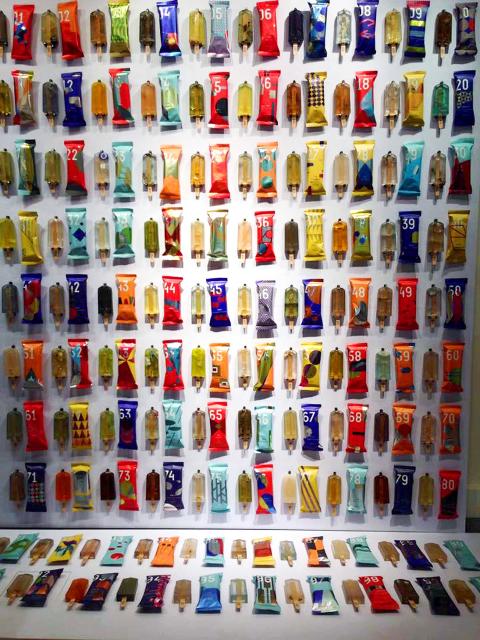Three young artists have made popsicles using water from 100 polluted sources across the nation to draw attention to the degradation of the nation’s water sources.
The “Polluted Water Popsicle Factory” organized by National Taiwan University of Arts visual design students, aims to draw attention to the degradation of the environment by creating a contrast between visual and psychological information, artist Hung Yi-chen (洪亦辰) said.
The trio on Wednesday uploaded a video featuring the popsicles on its Facebook page, after which the number of the group’s followers surged from 7,000 to 11,000, Hung said.

Photo: CNA, provided by the Polluted Water Popsicles Factory
The water samples were taken from sewage drains, rivers, harbors and wastewater pipes around the nation and were slow-frozen into popsicles, each with its own, individually designed wrapper, Hung said.
The water was collected from sampling locations used by water resource bureaus, she said, adding that they numbered the popsicles by sampling location from the north to the south.
Previous campaigns using posters have failed to raise public awareness and the group believes that using visual and psychological tactics to shock the audience might work better, Hung said.
“The stench of popsicle No. 1 from Keelung Harbor was the worst and it left a greasy coat on the bottle. The night market ditches are also pretty gross. A popsicle made from a ditch in Yunlin County was full of bugs, but water from Taitung County’s Chihshang (池上) was comparatively clean,” she said.
The artists experimented by giving popsicles to their classmates, who thought they looked pretty and delicious, but after they were told that they were made of dirty water, they threw them away, she said.
A yellow popsicle Hung showed reporters was made from water infested by the eggs of channeled applesnail, considered one of the world’s worst invasive species by international conservation groups.
Taipei World Trade Center, Exhibition Hall 1 is to showcase polyresin replicas of the popsicles from today through Monday.

Trips for more than 100,000 international and domestic air travelers could be disrupted as China launches a military exercise around Taiwan today, Taiwan’s Civil Aviation Administration (CAA) said yesterday. The exercise could affect nearly 900 flights scheduled to enter the Taipei Flight Information Region (FIR) during the exercise window, it added. A notice issued by the Chinese Civil Aviation Administration showed there would be seven temporary zones around the Taiwan Strait which would be used for live-fire exercises, lasting from 8am to 6pm today. All aircraft are prohibited from entering during exercise, it says. Taipei FIR has 14 international air routes and

Taiwan lacks effective and cost-efficient armaments to intercept rockets, making the planned “T-Dome” interception system necessary, two experts said on Tuesday. The concerns were raised after China’s military fired two waves of rockets during live-fire drills around Taiwan on Tuesday, part of two-day exercises code-named “Justice Mission 2025.” The first wave involved 17 rockets launched at 9am from Pingtan in China’s Fujian Province, according to Lieutenant General Hsieh Jih-sheng (謝日升) of the Office of the Deputy Chief of the General Staff for Intelligence at the Ministry of National Defense. Those rockets landed 70 nautical miles (129.6km) northeast of Keelung without flying over Taiwan,

City buses in Taipei and New Taipei City, as well as the Taipei MRT, would on Saturday begin accepting QR code payments from five electronic payment providers, the Taipei Department of Transportation said yesterday. The new option would allow passengers to use the “transportation QR code” feature from EasyWallet, iPass Money, iCash Pay, Jkopay or PXPay Plus. Passengers should open their preferred electronic payment app, select the “transportation code” — not the regular payment code — unlock it, and scan the code at ticket readers or gates, General Planning Division Director-General Liu Kuo-chu (劉國著) said. People should move through the

The Ministry of National Defense (MND) today released images of the military tracking China’s People's Liberation Army (PLA) movements during the latest round of Chinese drills around Taiwan. The PLA began "Justice Mission 2025" drills today, carrying out live-fire drills, simulated strikes on land and maritime targets, and exercises to blockade the nation's main ports. The exercises are to continue tomorrow, with the PLA announcing sea and air space restrictions for five zones around Taiwan for 10 hours starting from 8:30am. The ministry today released images showing a Chinese J-16 fighter jet tracked by a F-16V Block 20 jet and the